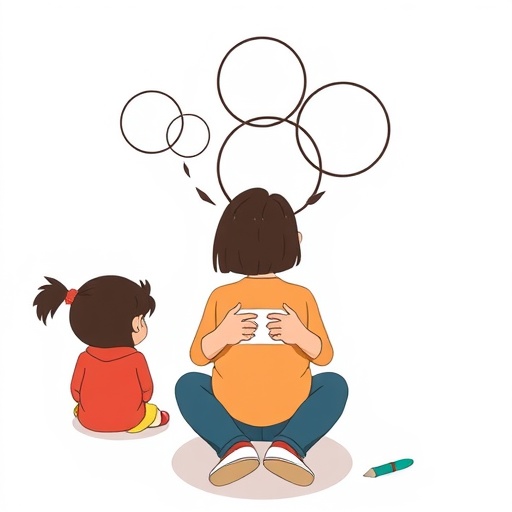Recent research sheds new light on the mental health challenges faced by parents of children with autism, particularly focusing on the intricacies of psychological needs satisfaction and its interplay with depressive symptoms. The study titled “A Cross-Lagged Panel Analysis of Basic Psychological Needs Satisfaction and Depressive Symptoms in Parents of Autistic Children: The Mediating Role of Parenting Stress,” published in the Journal of Autism and Developmental Disorders, provides a comprehensive analysis that is expected to resonate within both academic and public spheres alike.
The investigation seeks to uncover the complex relationships that exist between parents’ satisfaction of basic psychological needs—such as autonomy, competence, and relatedness—and their levels of depressive symptoms over time. This dynamic is particularly relevant in the context of parenting children with autism, where the emotional and psychological toll can be significant. The research employs a cross-lagged panel analysis, a rigorous statistical approach that examines these relationships bidirectionally across different time points.
One of the pivotal findings of the study indicates that a lack of satisfaction in basic psychological needs is closely linked to increased depressive symptoms among parents. This correlation highlights the importance of psychological well-being for parents as they navigate the challenges associated with raising children on the autism spectrum. The study suggests that interventions aimed at improving parents’ mental health may need to prioritize fostering an environment where their psychological needs are fully met.
Moreover, the role of parenting stress cannot be overstated in this research. Parenting stress often exacerbates feelings of inadequacy and hopelessness, thereby compounding depressive symptoms. Interestingly, the findings indicate that parenting stress acts as a mediator in the relationship between needs satisfaction and depressive symptoms. This means that when parents’ basic psychological needs are unmet, they experience higher levels of stress, which in turn increases the likelihood of developing depressive symptoms.
The interaction between stress and psychological need fulfillment presents a critical area for intervention. By addressing parenting stress—through support systems or resources designed to alleviate burden—professionals can potentially mitigate the impact of unmet needs on mental health. The implications are significant, not only for parents but also for institutions and organizations that support families with autistic children.
Parenting a child with autism is often described as a full-time job, and the emotional investment can lead to a state of chronic stress. Understanding the cyclical nature of needs satisfaction and depressive symptoms enables a more nuanced approach to support for these parents. The data presented in this research could catalyze the development of targeted psychological interventions, training programs, or community-based resources that empower parents and enhance their coping mechanisms.
As the research delves deeper, it emphasizes that enhancing parents’ psychological well-being is not just beneficial for them personally but can also have a profound impact on their parenting style and the overall family environment. When parents are supported in meeting their psychological needs, they are likely to be more present and engaged in their children’s lives, which is critical for fostering a nurturing atmosphere.
The study also highlights the importance of open conversations about mental health within the context of parenting children with autism. Traditional views often stigmatize mental health issues, making it difficult for parents to seek help or even recognize their struggles. By normalizing discussions around psychological needs and mental wellness, society can facilitate a culture where parents feel comfortable seeking the assistance they need.
As awareness grows about the psychological challenges faced by these parents, the findings of this research could influence policy changes that prioritize mental health support services for families dealing with autism. Initiatives could range from public health campaigns to community programs focused on enhancing parental mental health, ultimately benefiting the entire family unit.
In summary, the rigorous analysis conducted by Xu, Zhang, and Zhou unveils a complex web of relationships that have significant implications for both researchers and mental health practitioners. The correlations drawn between basic psychological needs, parenting stress, and depressive symptoms not only illuminate the pressing emotional needs of parents but also underscore the importance of intervening at multiple levels.
As we move forward, this research stands as a pivotal reference for future inquiries into parental mental health in the context of raising children with autism. It fosters an essential dialogue that could lead to transformative changes in how we view and support families navigating the realities of autism. With further exploration and validation of these findings, the potential for improved outcomes for both parents and children is immense.
By emphasizing the links between psychological need satisfaction, parenting stress, and depressive symptoms, it invites stakeholders from various fields to collaborate and create comprehensive support systems that uphold the mental health of a demographic that often goes unnoticed. Ultimately, it is a call to action for better resources, greater understanding, and a more compassionate approach to parenting in the modern world.
Subject of Research: Parental mental health and psychological needs in parents of autistic children.
Article Title: A Cross-Lagged Panel Analysis of Basic Psychological Needs Satisfaction and Depressive Symptoms in Parents of Autistic Children: The Mediating Role of Parenting Stress.
Article References:
Xu, C., Zhang, C. & Zhou, T. A Cross-Lagged Panel Analysis of Basic Psychological Needs Satisfaction and Depressive Symptoms in Parents of Autistic Children: The Mediating Role of Parenting Stress.
J Autism Dev Disord (2025). https://doi.org/10.1007/s10803-025-07149-4
Image Credits: AI Generated
DOI: https://doi.org/10.1007/s10803-025-07149-4
Keywords: Parenting stress, depressive symptoms, psychological needs, autism, mental health.




